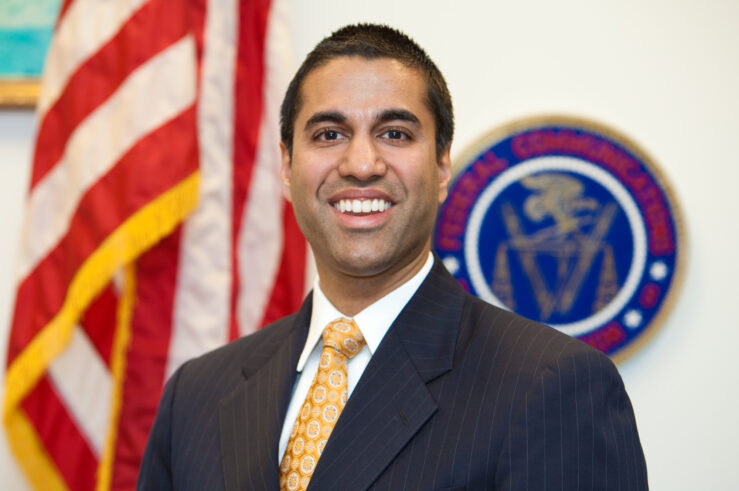Showing archive for: “DOJ”
The Second Circuit Misapplies the Per Se Rule in U.S. v. Apple
In its June 30 decision in United States v. Apple Inc., a three-judge Second Circuit panel departed from sound antitrust reasoning in holding that Apple’s e-book distribution agreement with various publishers was illegal per se. Judge Dennis Jacobs’ thoughtful dissent, which substantially informs the following discussion of this case, is worth a close read. In ... The Second Circuit Misapplies the Per Se Rule in U.S. v. Apple
FCC restrictions on joint sales agreements: Yet another FCC rule without basis in evidence or economics
Recently, Commissioner Pai praised the introduction of bipartisan legislation to protect joint sales agreements (“JSAs”) between local television stations. He explained that JSAs are contractual agreements that allow broadcasters to cut down on costs by using the same advertising sales force. The efficiencies created by JSAs have helped broadcasters to offer services that benefit consumers, ... FCC restrictions on joint sales agreements: Yet another FCC rule without basis in evidence or economics
Microsoft’s mobile innovation today undercuts arguments built on yesterday’s Microsoft antitrust case
Last year, Microsoft’s new CEO, Satya Nadella, seemed to break with the company’s longstanding “complain instead of compete” strategy to acknowledge that: We’re going to innovate with a challenger mindset…. We’re not coming at this as some incumbent. Among the first items on his agenda? Treating competing platforms like opportunities for innovation and expansion rather ... Microsoft’s mobile innovation today undercuts arguments built on yesterday’s Microsoft antitrust case
Undermining Investment in Standard Setting by Weakening Patents: How a Recent Justice Department Business Review Letter Gets Things Wrong
As I explained in a recent Heritage Foundation Legal Memorandum, the Institute of Electrical and Electronics Engineers’ (IEEE) New Patent Policy (NPP) threatens to devalue patents that cover standards; discourage involvement by innovative companies in IEEE standard setting; and undermine support for strong patents, which are critical to economic growth and innovation. The Legal Memorandum ... Undermining Investment in Standard Setting by Weakening Patents: How a Recent Justice Department Business Review Letter Gets Things Wrong
Dan Crane: Fact Checking Kessler’s “Fact Checking” on Direct Distribution
The following post was authored by Dan Crane, the Frederick Paul Furth, Sr. Professor of Law at the University of Michigan Law School and an occasional TOTM contributor. Last week, I released a public interest group open letter in support of Tesla’s right to distribute its cars directly. The letter attracted quite a bit of ... Dan Crane: Fact Checking Kessler’s “Fact Checking” on Direct Distribution
IEEE Patent Policy Change Would Undermine Property Rights and Innovation
American standard setting organizations (SSOs), which are private sector-based associations through which businesses come together to set voluntary industrial standards, confer great benefits on the modern economy. They enable virtually all products we rely upon in modern society (including mechanical, electrical, information, telecommunications, and other systems) to interoperate, thereby spurring innovation, efficiency, and consumer choice. ... IEEE Patent Policy Change Would Undermine Property Rights and Innovation
Heritage Foundation January 29 Conference on Obama Administration Antitrust Enforcement Record
During the 2008 presidential campaign Barack Obama criticized the Bush Administration for “the weakest record of antitrust enforcement of any administration in the last half century” and promised “to reinvigorate antitrust enforcement.” In particular, he singled out allegedly lax monopolization and merger enforcement as areas needing improvement, and also vowed “aggressive action to curb the ... Heritage Foundation January 29 Conference on Obama Administration Antitrust Enforcement Record
Grading Obama Administration Antitrust Policy
During the 2008 presidential campaign, Barack Obama criticized the Bush Administration for “the weakest record of antitrust enforcement of any administration in the last half century” and promised “to reinvigorate antitrust enforcement.” Has the Obama Administration’s antitrust enforcement record over the last six years lived up to this extravagant promise? More specifically, what grade should ... Grading Obama Administration Antitrust Policy
Spicy Documents Serve up a Paltry Antitrust Meal
There is always a temptation for antitrust agencies and plaintiffs to center a case around so-called “hot” documents — typically company documents with a snippet or sound-bites extracted, some times out of context. Some practitioners argue that “[h]ot document can be crucial to the outcome of any antitrust matter.” Although “hot” documents can help catch ... Spicy Documents Serve up a Paltry Antitrust Meal
Abuse of Dominance by Patentees: A Pro-Innovation Perspective
In my just-published article in The Antitrust Source, I argue that the law and economics literature on patents and error cost analysis demonstrate that the recent focus by U.S. (and foreign) antitrust enforcers on single-firm patent abuses is misplaced, and may reduce incentives to innovate. I recommend that antitrust enforcers focus instead on restrictions among ... Abuse of Dominance by Patentees: A Pro-Innovation Perspective
Double secret ex parte meetings at the FCC: Something’s amiss in the agency’s big transaction reviews
The Wall Street Journal dropped an FCC bombshell last week, although I’m not sure anyone noticed. In an article ostensibly about the possible role that MFNs might play in the Comcast/Time-Warner Cable merger, the Journal noted that The FCC is encouraging big media companies to offer feedback confidentially on Comcast’s $45-billion offer for Time Warner ... Double secret ex parte meetings at the FCC: Something’s amiss in the agency’s big transaction reviews
New Paper on SSOs, SEP and Antitrust by Joanna Tsai & Joshua Wright
An important new paper was recently posted to SSRN by Commissioner Joshua Wright and Joanna Tsai. It addresses a very hot topic in the innovation industries: the role of patented innovation in standard setting organizations (SSO), what are known as standard essential patents (SEP), and whether the nature of the contractual commitment that adheres to a ... New Paper on SSOs, SEP and Antitrust by Joanna Tsai & Joshua Wright






